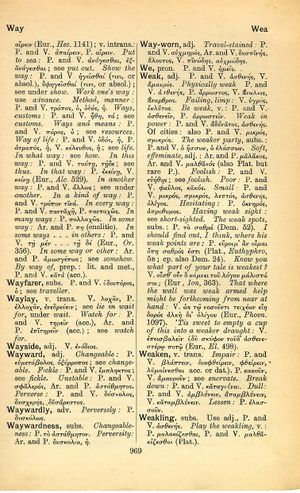weak: Difference between revisions
Κακὸν μέγιστον ἐν βροτοῖς ἀπληστία → Malumm est hominibus maximum immoderatio → Das größte Übel ist bei Menschen Völlerei
(Woodhouse 5) |
(CSV5) |
||
| Line 1: | Line 1: | ||
{{ | {{Woodhouse1 | ||
| | |Text=[[File:woodhouse_969.jpg|thumb|link={{filepath:woodhouse_969.jpg}}]]'''adj.''' | ||
P. and V. [[ἀσθενής]], V. [[ἀμαυρός]]. | |||
<b class="b2">Physically weak</b>: P. and V. [[ἀσθενής]], P. [[ἄρρωστος]], V. [[ἄναλκις]], [[ἄναρθρος]]. | |||
<b class="b2">Failing, limp</b>: V. [[ὑγρός]], [[ἔκλυτος]]. | |||
<b class="b2">Be weak</b>, v.: P. and V. ἀσθενεῖν, P. ἀρρωστεῖν. | |||
<b class="b2">Weak in power</b>: P. and V. [[ἀδύνατος]], [[ἀσθενής]]. | |||
<b class="b2">Of cities</b>: also P. and V. [[μικρός]], [[σμικρός]]. | |||
<b class="b2">The weaker party</b>, subs.: P. and V. ὁ [[ἥσσων]], ὁ [[ἐλάσσων]]. | |||
<b class="b2">Soft, effeminate</b>, adj.: Ar. and P. [[μαλακός]], Ar. and V. [[μαλθακός]] (also Plat. but rare P.). | |||
<b class="b2">Foolish</b>: P. and V. [[εὐήθης]]; see [[foolish]]. | |||
<b class="b2">Poor</b>: P. and V. [[φαῦλος]], [[κακός]]. | |||
<b class="b2">Small</b> P. and V. [[μικρός]], [[σμικρός]], [[λεπτός]], [[ἀσθενής]], [[ὀλίγος]]. | |||
<b class="b2">Hesitating</b>: P. [[ὀκνηρός]], [[ἀπρόθυμος]]. | |||
<b class="b2">Having weak sight</b>: see [[short-sighted]]. | |||
<b class="b2">The weak spots</b>, subs.: P. τὰ σαθρά (Dem. 52). | |||
<b class="b2">I should find out, I think, where his weak points are</b>: P. εὕροιμʼ ἂν [[οἶμαι]] ὅπη [[σαθρός]] ἐστι (Plat., <b class="b2">Euthyphro</b>, 5B; cp. also Dem. 24). | |||
<b class="b2">Know you what part of your tale is weakest?</b> V. οἶσθʼ οὖν ὃ κάμνει τοῦ λόγου μάλιστά σοι; (<b class="b2">Eur , Ion</b>, 363). | |||
<b class="b2">That where the wall was weak armed help might be forthcoming from near at hand: .</b> ὡς τῷ νοσοῦντι τειχέων εἴη δορὸς ἀλκὴ διʼ ὀλίγου (Eur., ''Phoen.'' 1097). | |||
<b class="b2">'Tis sweet to empty a cup of this into a weaker draught</b>: V. ἐπεισβαλεῖν ἡδὺ σκύφον τοῦδʼ ἀσθενεστέρῳ ποτῷ (Eur., ''El.'' 498). | |||
}} | }} | ||
Revision as of 10:09, 21 July 2017
English > Greek (Woodhouse)
adj.
P. and V. ἀσθενής, V. ἀμαυρός.
Physically weak: P. and V. ἀσθενής, P. ἄρρωστος, V. ἄναλκις, ἄναρθρος.
Failing, limp: V. ὑγρός, ἔκλυτος.
Be weak, v.: P. and V. ἀσθενεῖν, P. ἀρρωστεῖν.
Weak in power: P. and V. ἀδύνατος, ἀσθενής.
Of cities: also P. and V. μικρός, σμικρός.
The weaker party, subs.: P. and V. ὁ ἥσσων, ὁ ἐλάσσων.
Soft, effeminate, adj.: Ar. and P. μαλακός, Ar. and V. μαλθακός (also Plat. but rare P.).
Foolish: P. and V. εὐήθης; see foolish.
Poor: P. and V. φαῦλος, κακός.
Small P. and V. μικρός, σμικρός, λεπτός, ἀσθενής, ὀλίγος.
Hesitating: P. ὀκνηρός, ἀπρόθυμος.
Having weak sight: see short-sighted.
The weak spots, subs.: P. τὰ σαθρά (Dem. 52).
I should find out, I think, where his weak points are: P. εὕροιμʼ ἂν οἶμαι ὅπη σαθρός ἐστι (Plat., Euthyphro, 5B; cp. also Dem. 24).
Know you what part of your tale is weakest? V. οἶσθʼ οὖν ὃ κάμνει τοῦ λόγου μάλιστά σοι; (Eur , Ion, 363).
That where the wall was weak armed help might be forthcoming from near at hand: . ὡς τῷ νοσοῦντι τειχέων εἴη δορὸς ἀλκὴ διʼ ὀλίγου (Eur., Phoen. 1097).
'Tis sweet to empty a cup of this into a weaker draught: V. ἐπεισβαλεῖν ἡδὺ σκύφον τοῦδʼ ἀσθενεστέρῳ ποτῷ (Eur., El. 498).

